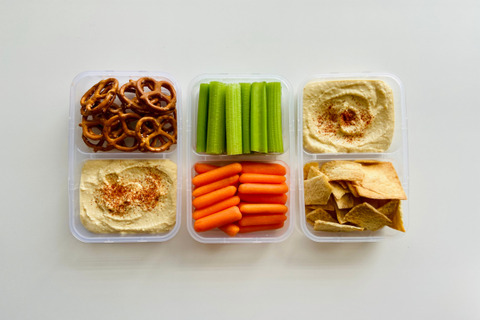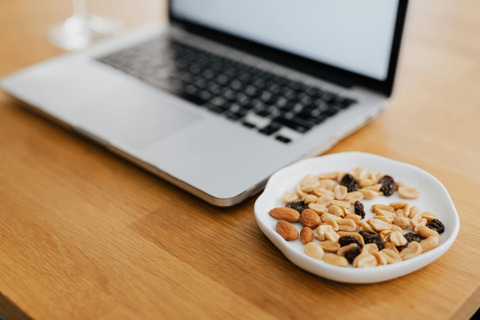
Why Snacking Matters More Than You Think
Snacking is not inherently bad. The problem usually comes from mindless choices or reaching for whatever is closest. When you understand how snacks affect blood sugar, hunger signals and overall energy, you see why they deserve attention. Balanced snacks can prevent the afternoon crash, reduce overeating during meals and support consistent energy throughout the day. Poor snack choices can do the opposite. Many experts believe that when you skip snacks or rely on sugary or highly processed foods, your hunger rapidly increases and you become more likely to reach for even less balanced options later. Building awareness around snacking helps you make choices that benefit your long term health rather than short term impulses.
Choosing Snacks That Keep You Full
A smart snack should contain a mix of protein, healthy fats and fiber. These three components slow digestion and keep you satisfied for longer periods. For example, pairing fruit with nuts, yogurt with berries or hummus with vegetables gives you a better blend of nutrients than grabbing a cookie or a handful of chips. If you do not fully understand why this matters, think of protein as the builder of your tissues, healthy fats as the supporter of your hormones and brain activity, and fiber as the element that keeps digestion steady. Together, they create a slow release of energy that prevents spikes and crashes in blood sugar. When your blood sugar stays stable, your cravings naturally decrease.
Understanding Cravings and What They Mean
Cravings are not random. They often come from imbalances in hunger hormones, stress, fatigue or emotional triggers. Sometimes cravings appear because you waited too long to eat. Other times they arise when your meals lack nutrients and your body keeps searching for quick energy. Recent studies suggest that when you consistently eat balanced snacks, your cravings become more manageable. It is also helpful to pay attention to emotional eating. Many people reach for sweets or salty foods when they feel overwhelmed or bored. Recognizing these patterns can help you pause and choose something nourishing instead.
Healthy Alternatives That Satisfy Sweet Cravings
If you love sweet flavors, you do not need to eliminate them. You can choose options that satisfy your taste buds without sending your blood sugar on a roller coaster. Fresh fruit, dates stuffed with nut butter, Greek yogurt with a drizzle of honey or dark chocolate pieces can give you sweetness with nutrients. Another option is making smoothies with ingredients like banana, spinach, berries and milk. These still taste sweet but deliver vitamins and minerals your body appreciates. A common myth is that all sugar is equally harmful. Natural sugars from fruit digest differently because they come with fiber and antioxidants.
Healthy Alternatives for Salty or Crunchy Cravings
If you crave something salty or crunchy, there are plenty of smarter swaps. Popcorn made at home, lightly salted nuts, roasted chickpeas or whole grain crackers with cheese can keep you satisfied. These choices give you texture without leaving you bloated or unsatisfied. Many people believe salty snacks must be unhealthy, but the real issue is usually added oils or poor quality ingredients. By choosing whole food based options, you still enjoy the snack while supporting your health goals.
Tips for Planning and Preparing Smart Snacks
Planning ahead makes smart snacking almost effortless. Preparing snacks on weekends or keeping a small container of nuts in your bag reduces the temptation to grab something quick and low in nutrients. Washing fruit, cutting vegetables or portioning out snack servings helps you stick with your goals even on busy days. You can also build a simple snack station in your kitchen so the best choices stay visible. Many experts believe that convenience is one of the strongest influences on food choices. If you make healthy snacks more convenient than unhealthy ones, you are far more likely to reach for them.
Common Mistakes That Lead to Poor Snacking Habits
Many snacking mistakes are easy to fix once you recognize them. Eating straight from the package makes it difficult to track portions. Relying on snacks that are high in sugar but low in nutrients gives you short bursts of energy followed by drops that make you crave even more. Another mistake is confusing thirst with hunger. Drinking water before grabbing a snack can help you determine whether your body actually needs food. Finally, skipping snacks entirely can backfire if it leads to intense hunger later. When you get too hungry, balanced decisions become much harder to make.
Frequently Asked Questions
1.What makes a snack healthy
A snack is healthy when it contains nutrients that keep you full, such as protein, healthy fats and fiber. These help maintain steady energy instead of causing sharp blood sugar spikes.
2.How many snacks should I eat each day
Most people feel best with one or two snacks. The exact number depends on your schedule, activity level and how large your meals are.
3.Are packaged snacks always unhealthy
Not always. Some packaged snacks use whole ingredients and reasonable portions. Reading labels and choosing items with simple ingredients makes it easier to decide.
4.Why do I still feel hungry after snacking
You might be choosing snacks that are mostly sugar or quick carbs. Balanced snacks with protein or fats keep you full for longer.
5.Can snacking help with weight management
Yes. When done thoughtfully, snacking can help control hunger and prevent overeating during meals.
Smart snacking for better health and steady cravings is a topic many people overlook even though it plays a huge role in daily energy, mood and long term wellness. When you think about improving your health, you probably jump straight to full meals, strict routines or big lifestyle changes. Snacking rarely feels important enough to examine closely, yet it often determines whether you stay on track or spiral into overeating, fatigue or cravings that seem impossible to control. Snacking is something you do without thinking, which means it can either support your goals or quietly sabotage them. This guide will show you how to make snacking work for you by choosing nourishing options that satisfy your hunger, stabilize your energy and keep your cravings in check. With the right approach, snacking becomes a simple tool that fits naturally into your day and helps you move toward the healthier life you want.
Why Snacking Matters More Than You Think
Snacking is not inherently bad. The problem usually comes from mindless choices or reaching for whatever is closest. When you understand how snacks affect blood sugar, hunger signals and overall energy, you see why they deserve attention. Balanced snacks can prevent the afternoon crash, reduce overeating during meals and support consistent energy throughout the day. Poor snack choices can do the opposite. Many experts believe that when you skip snacks or rely on sugary or highly processed foods, your hunger rapidly increases and you become more likely to reach for even less balanced options later. Building awareness around snacking helps you make choices that benefit your long term health rather than short term impulses.
Choosing Snacks That Keep You Full
A smart snack should contain a mix of protein, healthy fats and fiber. These three components slow digestion and keep you satisfied for longer periods. For example, pairing fruit with nuts, yogurt with berries or hummus with vegetables gives you a better blend of nutrients than grabbing a cookie or a handful of chips. If you do not fully understand why this matters, think of protein as the builder of your tissues, healthy fats as the supporter of your hormones and brain activity, and fiber as the element that keeps digestion steady. Together, they create a slow release of energy that prevents spikes and crashes in blood sugar. When your blood sugar stays stable, your cravings naturally decrease.
Understanding Cravings and What They Mean
Cravings are not random. They often come from imbalances in hunger hormones, stress, fatigue or emotional triggers. Sometimes cravings appear because you waited too long to eat. Other times they arise when your meals lack nutrients and your body keeps searching for quick energy. Recent studies suggest that when you consistently eat balanced snacks, your cravings become more manageable. It is also helpful to pay attention to emotional eating. Many people reach for sweets or salty foods when they feel overwhelmed or bored. Recognizing these patterns can help you pause and choose something nourishing instead.
Healthy Alternatives That Satisfy Sweet Cravings
If you love sweet flavors, you do not need to eliminate them. You can choose options that satisfy your taste buds without sending your blood sugar on a roller coaster. Fresh fruit, dates stuffed with nut butter, Greek yogurt with a drizzle of honey or dark chocolate pieces can give you sweetness with nutrients. Another option is making smoothies with ingredients like banana, spinach, berries and milk. These still taste sweet but deliver vitamins and minerals your body appreciates. A common myth is that all sugar is equally harmful. Natural sugars from fruit digest differently because they come with fiber and antioxidants.
Healthy Alternatives for Salty or Crunchy Cravings
If you crave something salty or crunchy, there are plenty of smarter swaps. Popcorn made at home, lightly salted nuts, roasted chickpeas or whole grain crackers with cheese can keep you satisfied. These choices give you texture without leaving you bloated or unsatisfied. Many people believe salty snacks must be unhealthy, but the real issue is usually added oils or poor quality ingredients. By choosing whole food based options, you still enjoy the snack while supporting your health goals.
Tips for Planning and Preparing Smart Snacks
Planning ahead makes smart snacking almost effortless. Preparing snacks on weekends or keeping a small container of nuts in your bag reduces the temptation to grab something quick and low in nutrients. Washing fruit, cutting vegetables or portioning out snack servings helps you stick with your goals even on busy days. You can also build a simple snack station in your kitchen so the best choices stay visible. Many experts believe that convenience is one of the strongest influences on food choices. If you make healthy snacks more convenient than unhealthy ones, you are far more likely to reach for them.
Common Mistakes That Lead to Poor Snacking Habits
Many snacking mistakes are easy to fix once you recognize them. Eating straight from the package makes it difficult to track portions. Relying on snacks that are high in sugar but low in nutrients gives you short bursts of energy followed by drops that make you crave even more. Another mistake is confusing thirst with hunger. Drinking water before grabbing a snack can help you determine whether your body actually needs food. Finally, skipping snacks entirely can backfire if it leads to intense hunger later. When you get too hungry, balanced decisions become much harder to make.
Frequently Asked Questions
1.What makes a snack healthy
A snack is healthy when it contains nutrients that keep you full, such as protein, healthy fats and fiber. These help maintain steady energy instead of causing sharp blood sugar spikes.
2.How many snacks should I eat each day
Most people feel best with one or two snacks. The exact number depends on your schedule, activity level and how large your meals are.
3.Are packaged snacks always unhealthy
Not always. Some packaged snacks use whole ingredients and reasonable portions. Reading labels and choosing items with simple ingredients makes it easier to decide.
4.Why do I still feel hungry after snacking
You might be choosing snacks that are mostly sugar or quick carbs. Balanced snacks with protein or fats keep you full for longer.
5.Can snacking help with weight management
Yes. When done thoughtfully, snacking can help control hunger and prevent overeating during meals.

Conclusion
Smart snacking for better health and steady cravings is simpler than it seems once you understand how to work with your body instead of against it. When you choose snacks that stabilize your energy and support your hunger cues, you create patterns that make healthy living feel easier and more sustainable. Snacking does not have to be something you avoid or feel guilty about. It becomes a helpful habit when you approach it with intention and awareness. By planning ahead, choosing nourishing ingredients and paying attention to your cravings, you can transform snacking into a supportive part of your wellness routine. Consistency matters, and these small moments of choice add up over time. With every balanced snack, you reinforce the healthier lifestyle you want to build.
Related posts




